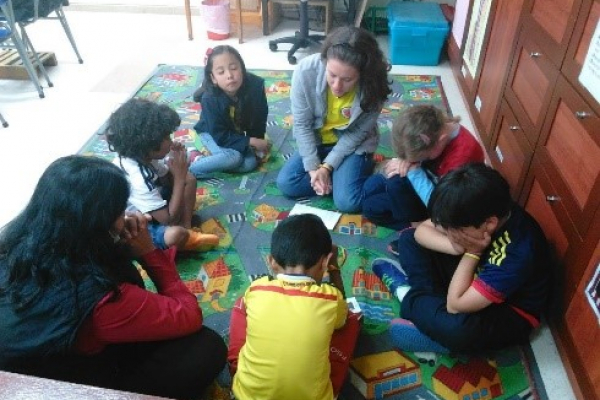Hospitality in Foreign Language Education

I was a stranger and you invited me in. –Jesus[1]
In a previous article, I shared some thoughts on how Christian teachers can shape language learners to be a blessing to their hosts when they go abroad. The fact is, however, many of our learners may never leave their home country. Yet the children of Israel were not only called to be a light to the nations around them but also to show hospitality to the foreigner in their midst. Language skills can fade with time, but if we can help students cultivate a welcoming heart of love for the stranger, it will have a lifelong impact. Exploring hospitality also helps us think about our own classrooms in a new way. David Smith and Barbara Carvill suggest, “Hospitality to the stranger is both a spiritual virtue and a fruitful metaphor for foreign language education.”[2]
Hospitality as a metaphor for education
What is education like? Is a school a factory, assembling parts to produce finished products? Is a teacher a gardener, watering, protecting plants from weeds? Is teaching filling a container, or lighting a fire? Henri Nouwen proposes hospitality as a metaphor for education. The teacher, as host, creates a welcoming space where students can grow and develop. “But the process will take place in both directions. ‘[S]tudents,’ Nouwen insists, ‘are not just the poor, needy, ignorant beggars who come to the man or woman of knowledge, but they are indeed like guests who honor the house with their visit and will not leave without having made their own contribution.’”[3]Hospitality in foreign language education
We can extend the metaphor of hospitality beyond the classroom to represent the way both foreign language teachers and students interact with otherness. If we understand this metaphor as a way of preparing students to be a blessing to the stranger, we understand:- A host has a home which she can open to others. In this metaphor, the authors suggest this means “to belong somewhere, to accept one’s roots in a particular culture.”[4] Our cultural identity, like our home, is not a place to stay safely separated from others but is a gift to share.
- A host is honest about the state of his home. A home needn’t be richly furnished or even perfectly clean in order to be a hospitable space for guests. However, if I fail to warn my guest about my scalding shower or pretend there isn’t a step missing, I expose my guests to danger and am not a good host. In the same way, we must be honest about the flawed and fallen aspects of our home culture.
Embrace, another metaphor
As we develop a healthy perspective on our own culture and begin to learn the language of another culture, it does not mean we reject our own cultural identity, any more than hosting others means giving up one’s house. However, we do not remain unchanged in the process. Smith and Carvill use Miroslav Volf’s image of embrace to portray this:In an embrace I open my arms to create space in myself for the other [as] a sign that I do not want to be by myself only, an invitation for the other to come in and feel at home with me. In an embrace I also close my arms around the other [as] a sign that I want the other to become part of me while at the same time I maintain my own identity. By becoming part of me, the other enriches me.[6]I believe contemplating these metaphors will not only make us better teachers but also make us better guests and hosts in our home culture, or wherever God has called us to serve.
LinGo English Enriched Schools Central European Coordinator
TeachBeyond



